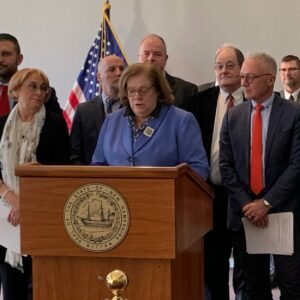Republicans in the New Hampshire Senate acknowledge the state budget battle will be the biggest challenge of the upcoming session, but they also believe their expanded majority gives them a mandate to act on other priorities.
Among them are a ban on sanctuary cities and passing parent’s rights legislation, two proposals that were narrowly defeated last session.
“Republicans will deliver a balanced budget with no income tax, sales tax, or capital gains tax. New Hampshire voters entrusted us with increased majorities in the State House, and we are working to deliver on this mandate,” said new Senate President Sharon Carson (R-Londonderry), taking over after the retirement of Wolfeboro Republican Jeb Bradley.
After last session — when the GOP majority in the 24-member Senate was larger than in the 400-seat House — Republicans are feeling the optimism that comes from large majorities. In the House, Republicans hold a 221-177-1 edge, and in the Senate, they have a 16-8 supermajority.
What do they plan to do with it? Senate GOP leaders held a press conference at the State House Wednesday to talk about it.
“We will pass a Parents Bill of Rights to guarantee that parents always know what is happening with their kids in New Hampshire schools,” said Majority Leader Regina Birdsell (R-Hampstead). “We will block sanctuary cities in our state and ensure that New Hampshire remains the safest state in the nation. We will ban U.S. adversaries from owning property near our military bases. We will keep our communities safe by continuing to support our Northern Border Alliance and block any attempts to repeal it.”
Democrats unanimously opposed banning sanctuary cities and parental rights legislation. During a press conference on Tuesday, House Minority Leader Alexis Simpson (D-Exeter) claimed the GOP is using these “culture war issues to distract from the real issues facing Granite Staters.”
Asked about Simpson’s remark, Birdsell replied, “Bless her heart.
“We knocked doors, we talked to our constituents, and these issues were very important to them,” Birdsell said. “If they had done the same thing, maybe they would have heard it, too. And you can tell from Democrats in Congress that they are hearing it.”
On Tuesday, newly-elected Democrat U.S. Rep. Maggie Goodlander surprised many Granite State Democrats when her first-ever vote was to break with her party and support the Laken Riley Act, which increases enforcement against illegal immigrants who commit robbery and theft.
While Democrats blame Republican tax cuts for rising property taxes, Republicans continue to point to what they believe is the real property tax problem: local spending.
“We will increase transparency in school budgets, we will continue to support funding for special education, and we will provide communities with property tax relief by sending state aid to local school districts through the student-centered education funding formula,” Carson said Wednesday.
Asked about complaints from towns and school districts that the state isn’t sending them enough money, Carson pushed back.
“Quite frankly, a lot of the problems that municipalities and school districts are experiencing are creatures of their own making,” she said.
The debate is particularly resonant in the wake of Saturday’s vote at a Kearsarge Regional School District meeting Saturday to reject a $27,000 per-pupil spending cap as too low. Attendees insisted on a budget spending more than $33,000 per student, an amount many Granite Staters see as exorbitant.
According to a press release from the State GOP caucus, its funding formula “targets state aid where it is most needed, which increased by $169 million over the last biennium and a 31 percent increase over the next 10 years.”
One area of bipartisan overlap has already emerged: Support for the Housing Champions program.
Senate Minority Leader Rebecca Perkins Kwoka pledged her party’s support for the initiative, which uses state funds to encourage communities to promote the construction of new housing.
To qualify, communities must demonstrate they’ve enacted zoning and land use regulations that promote workforce housing and implemented sewer and water infrastructure improvements, among other metrics.
“We have legislation this year to expand our already successful housing champions program, which has awarded real dollars to our cities,” Perkins Kwoka said Tuesday.
Republicans are on board as well, pledging to “support the Housing Champions program by prioritizing state infrastructure investments to communities making zoning changes to allow workforce housing developments.”
Asked to name what she believes are the very top priorities, Birdsell shot back, “The budget. Period.
“This is going to be a tough year, so we’re just going to have to put our heads down and find a way to pass a balanced budget. The constitution requires it.”





